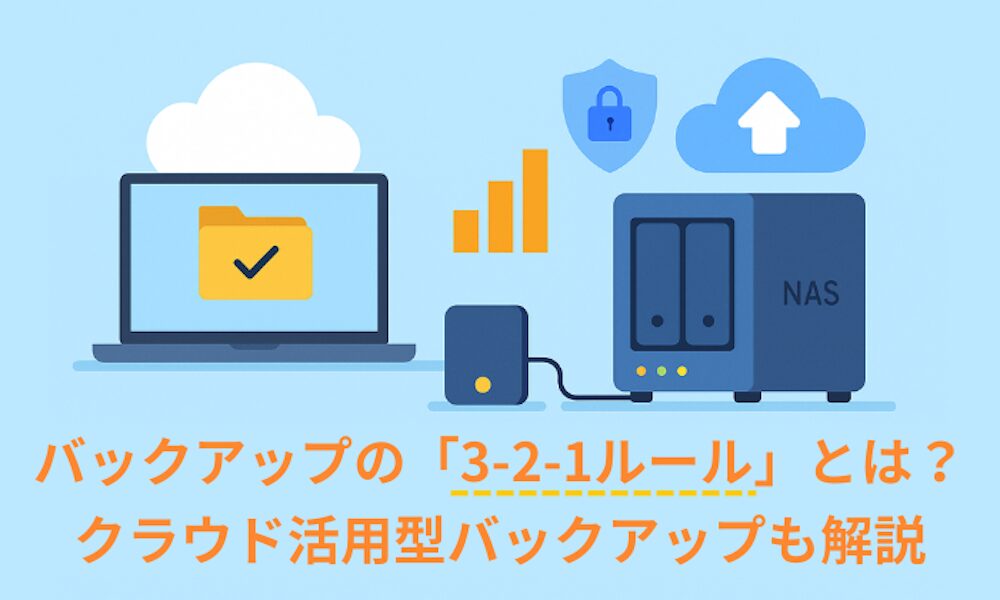Daily backups are essential for protecting corporate data. They are an important part of ensuring that business can continue as normal even in the event of unexpected situations such as natural disasters or PC problems.
However, did you know that just making backups is not enough for the minimum BCP (Business Continuity Plan) and DR (Disaster Recovery) measures? In this article, we will introduce the concept of backup testing (restore testing) that should be considered in conjunction with regular backups.
What is backup testing?
Backup testing refers to testing and confirming during normal operations whether or not the backed-up data can be properly restored.
Even if data is backed up regularly and correctly, it will be meaningless if the backed-up files and folders cannot be restored in an emergency.
It's easy to think, "I always back up my data, so I'm fine." However, not surprisingly, problems can still occur. In fact, approximately 1/3 of all companies experience difficulties when restoring from backup data.
Why are backup tests necessary?
As evidenced by the recent COVID-19 pandemic, unforeseen events can affect businesses and society. As Japan regularly experiences earthquakes and typhoons, it is important to be prepared for all contingencies.
Under such circumstances, data and system backups are now becoming an essential part of corporate risk management. However, while most companies have backups, many have not actually tested them.
Without a backup test, there is no way to know if your data can be restored in a crisis. If it cannot be restored, not only will all the time and money spent on backups be wasted, but for small and medium-sized companies and startups, there is also a risk that it will directly lead to a business continuity crisis.
In order to make your regular backups truly meaningful, backup testing is an extremely important task that should not be neglected.

What is checked in a backup test?
In the backup test, it is important to check not only whether the backed-up data can be restored without any problems, but also whether the assumed RPO (recovery point objective) and RTO (recovery time objective) can be met.
RPO is expressed as a time measurement from the loss event to the most recent preceding backup. In other words, it refers to the amount of time that has passed since the last backup. For example, if you make regular backups every day, your RPO is 24 hours. In the event of an incident, data modified or newly created after the latest backup will be lost. With a backup test, it is necessary to confirm whether the data saved at the RPO point and set in advance can be restored properly.
On the other hand, RTO refers to how much time (targeted valued) an application can be down without causing significant damage to the business. For example, if you decide that three hours is the maximum downtime that is acceptable for your company, then your RTO is three hours. Businesses must determine what is an acceptable RTO and plan accordingly. A backup test will confirm if the determined RTO can be met.
How often should backup tests be performed?
Only performing backup tests occasionally and randomly is insufficient and dangerous for business. In order to ensure the effectiveness of backups and backup tests, it is essential to conduct tests on a regular basis. If possible, try to run backup tests at least once a month or so.
However, conducting a backup test for all the data every month can be a burden on your resources. Therefore, it is recommended to perform a partial restore test of particularly important or high-risk data on a monthly basis, and a complete restore test of all data on a semi-annual or annual basis.
Why is the cloud the best choice for backup?
In regards to backups, until a few years ago, site backups were the norm, saving data to an internal server. However, in the past few years, more and more small and medium-sized businesses, as well as large corporations, have been making the transition to cloud backup. For the following advantages, it is gaining popularity as a smart choice for today's times:
• Secure against ransomware or other malware attacks
• Protected from natural disasters or power outages
• No need to maintain and update backup servers
• Extremely easy to set up - even a novice
• Highly reliable
Tsukaeru Cloud Backup is affordable and easy to use!
The Tsukaeru Cloud Backup service provided by Tsukaeru.net is a complete cloud-based backup solution that can be easily introduced without the need for extra equipment or initial costs. This high-quality cloud backup service is easy to use, safe, and affordable and has been well received by our clients nationwide.
• Simple: Protects all data, including OS, with just five minutes of setup.
• Secure: Data is encrypted with AES-256 in your environment and transferred with AES-256.
• Affordable: Data protection measures start from 30 JPY per day/0.98 JPY per 1GB regardless of how much space you need.
A 30-day free trial is currently available, allowing you to experience all the benefits of cloud backup without any cost. To find out more, please contact us using the form or call us at the telephone number below.
Click here for details of the Tsukaeru Cloud Backup service.

Call toll-free: 0120-961-166
Office hours: 10:00-17:00



















